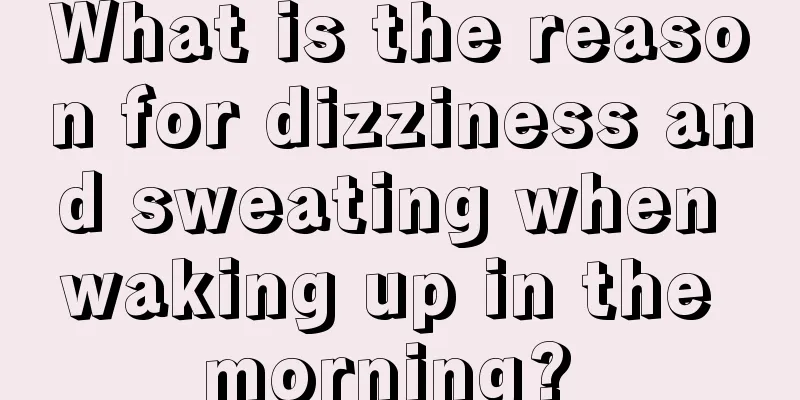What is the reason for dizziness and sweating when waking up in the morning?

|
If you get up in the morning and feel dizzy and sweating, you need to pay attention to whether it is physiological or pathological night sweats. If it is pathological night sweats, treatment is required. These symptoms are common in people with low blood calcium, diabetes, or tracheal diseases. 1. Physiological night sweats: In childhood, the skin is very tender, contains more water, has abundant capillaries, has active metabolism, and the autonomic nervous system regulation function is not yet perfect, so it is easy to sweat during activities. If children are too active before going to bed, the metabolism of various organs in the body will be active, which can increase the body's heat production. During sleep, the blood vessels in the skin will dilate, the sweat glands will secrete more, and the child will sweat profusely to help dissipate heat. Secondly, eating before going to bed can enhance gastrointestinal motility, increase gastric juice secretion, and increase sweat gland secretion, which can cause children to sweat more after falling asleep, especially within the first 2 hours of falling asleep. In addition, if the indoor temperature is too high, or the quilt is too thick, or electric blanket is used, it can cause profuse sweating during sleep. 2. Pathological night sweats: Some people sweat mainly in the first half of the night after falling asleep, which is often caused by low blood calcium. Low calcium can easily increase the excitability of the sympathetic nerves, just like turning on the "faucet" of the sweat glands. This situation is particularly common in children with rickets. However, night sweats are not a unique symptom of rickets. A comprehensive analysis should be conducted based on the child's feeding conditions, outdoor activities, etc. Blood calcium, blood phosphorus and wrist bone X-rays should also be checked to determine whether the child has active rickets. 3. Middle ear and inner ear diseases: Different ear problems can cause dizziness, such as otitis media, Meniere's disease, etc. Common cold viruses can also invade the inner ear and cause problems, and even lead to vomiting. 4. Drug influence: Some antihypertensive drugs, heart and diabetes drugs, and even cold sensitivity drugs may have this side effect. 5. Chronic diseases: If diabetes, bronchial disease, kidney disease, etc. are not well controlled, the above situation (such as low blood sugar) may also occur. 6. Arrhythmia: Heart disease causes abnormal oxygen supply to the brain and causes dizziness, among which slow heartbeat has a greater impact. |
>>: Which type of jasmine tea is best?
Recommend
How to remove oil stains from clothes
The most difficult thing to clean when washing cl...
How to make eyebrows thicker? 8 tips to teach you how to make eyebrows dark and thick
Eyebrows are extremely important to people. They ...
What medicine should I use for skin cancer ulcers
Skin cancer is a malignant tumor of the skin, a v...
How long after surgery can I dye my hair
Nowadays, many women like to dye their hair into ...
Which hospital is best for melanoma treatment
Melanoma, also known as malignant melanoma, is a ...
Toothpaste is not just for brushing your teeth—32 unusual uses!
Is a small piece of toothpaste only used for brus...
Discover the clinical symptoms of melanoma as early as possible
Melanoma is highly malignant and metastasizes qui...
What to do if your high school child hates studying
School aversion is a relatively abnormal behavior...
What are the treatments for gastrointestinal polyps?
For diseases like gastrointestinal polyps, the fi...
Pelvic separation 0.5 vaginal bleeding
Pelvic separation of 0.5 cm accompanied by vagina...
6 major indications for total laryngectomy
Total laryngectomy is a safe and reliable method ...
What is the probability of cure after rectal cancer surgery
Rectal cancer is a type of malignant tumor of the...
Is meningioma serious? What harm will it cause?
Meningioma is a common type of intracranial tumor...
Can soaking your feet and sweating help detoxify?
Soaking your feet in hot water before going to be...
Nursing methods for endometrial cancer
Recently, according to the feedback from many end...









